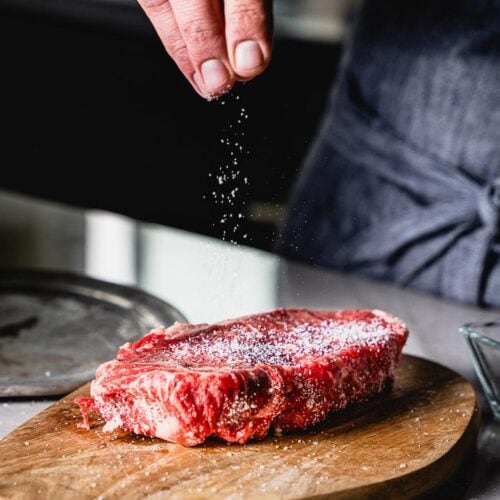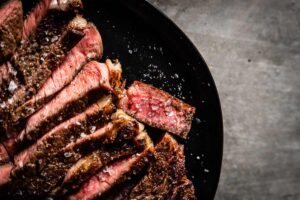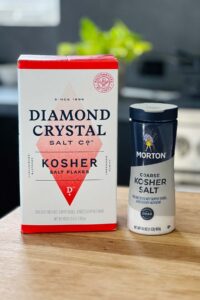Salt is such an essential and magical ingredient. Meat without salt just isn’t worth eating. It is an absolutely crucial seasoning that brings out the flavors of the meat, making it juicier and more tender at the same time. Simply throwing a little salt at the wrong time can hurt the end result. While salting at the right time has big benefits.
the right salt + the right amount + at the right time = truly better results
The Key to Salting Meat
Food shouldn’t taste salty. It should taste like itself, in the best way possible. Properly salting meat – using the right amount and technique – boosts flavor without making the dish taste salty. You shouldn’t even know the salt is there, just that the food tastes great. If you salt at the right time, it might feel like you are over-salting. But having patience pays off.
When to Salt Meat
The further ahead you salt the meat, the less pronounced the salt flavor will be. Salt applied well in advance has time to fully blend into the meat.
Best Time: 24 to 48 hours before cooking
Salting meat 1-2 days in advance allows time for the salt to fully penetrate deep into the meat as it rests uncovered on a wire rack in the refrigerator. As the salt sits on the exterior, it draws moisture out. This moisture mixes with the salt to create a brine that is then reabsorbed into the meat. After the brine is reabsorbed, the surface will also dry out (in a good way).
The longer the meat sits with the salt, the deeper the seasoning and moisture goes and it actually changes the meat’s structure and acts as a natural tenderizer.
Second Best: 45 minutes before cooking.
If you don’t have time to salt 1-2 days in advance, salting 45 minutes before cooking still allows some time for the salt to draw out moisture and begins to penetrate the meat.
Avoid salting less than 45 minutes before cooking. The salt won’t have enough time to properly season the meat. It will draw moisture to the surface, but not have enough time to be re-absorbed back in leaving this moisture on the surface. This will make it difficult to form a crust during the sear.
*If you don’t have time to salt in advance, salt right before the meat hits the heat. This will nicely season the outside surface, but not give the salt enough time to pull moisture out so you can still get a nice sear and crust.
How Much Salt Should You Use?
1 to 2 teaspoons of Diamond Crystal kosher salt per pound of meat (and about 1/2 tsp to 1 tsp if using Morton brand kosher salt). Check out the salt conversion chart and calculator to help convert between different types of salt.
Yes, there is a variation in the amount above because it does depend on what the specific cut is. The larger and fattier the cut, the more salt it can handle. For a steak, you might go on the lower end of the scale, and for a big fatty prime rib roast, you would go towards the larger amounts.
Double Salting
With all this salting info in mind, there is a trick that restaurant chefs use for perfectly seasoned meat that is bursting with flavor:
Use a two-step salting process where you first season 1-2 days in advance as discussed above. Then right before serving, add a second sprinkling of finishing salt to the sliced meat. This light finishing salt highlights the surface flavors and can add an extra crunchy texture and element to the presentation.
The Best Types of Salt for Meat
- All Around Salt: Diamond Crystal kosher salt is my preferred everyday go-to salt for seasoning meat and cooking with. It has larger flakes that are easy to sprinkle with your fingers and provide an even coating. Morton Kosher salt has smaller flakes and is denser and heavier by volume, so you will use about half the amount by volume as you would Diamond Crystal brand. I have tested both, and always go back to Diamond Crystal.
- Finishing salts: Flaky sea salts like Maldon are great finishing salts, sprinkled on at the end. Their delicate crystals add crunch and burst with briny flavor. There are also smoked versions that can pair great with grilled foods.
Tips for Salting Meat
- Bring meat home from the store and salt it right away.
- Standardize your brand of salt for consistency.
- Use more salt for fattier cuts than leaner cuts.
- Distribute salt evenly over all surfaces of the meat by sprinkling it with your fingers from well above so it can evenly distribute.
When to Salt Other Foods
The larger and fattier the food, the more time it should spend with the salt. The more delicate and smaller, the less time it needs to be properly seasoned.
Foods to Salt 12 to 24 hours before cooking:
- Large cuts of meat and roasts
- Steak
- Thick Pork Chops
- Whole Chicken
- Turkey
Foods to Salt Right Before Cooking:
- Fish and Seafood
- Burgers
- Chicken Breasts
Foods to Salt While Cooking:
- Pasta
- Rice
- Potatoes
- Soups, stews, and sauces
- Blanched vegetables
- Sauteed vegetables
Foods to Salt After Cooking:
- Any dish that wants, needs or deserves a pop of finishing salt for flavor and texture gets salted after. Such as eggs, steaks, chocolate and even cocktails can benefit from a little salt at the end.







I’m a little confused. The article states to salt meat 24-48 hours before cooking. The article concludes with a chart stating:
Foods to Salt 12 to 24 hours before cooking:
Large cuts of meat and roasts
Steak
Thick Pork Chops
Whole Chicken
Turkey
What meats are best salted 24-48 hours as the article starts out?